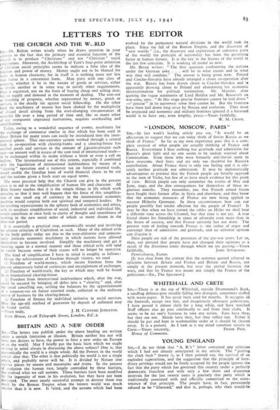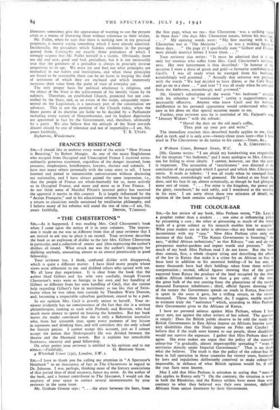YOUNG ENGLAND Sue,—I do not think that "A. R.'s "
letter contained any criticism which I had not already anticipated in my article. The "putting the clock back" theory is, as I then pointed out, the survival of an exploded superstition, and the suggestion that the principle of here- ditary privilege would not be freely accepted by the people ignores the fact that the party which has governed this country under a perfectly democratic franchise and with only a few short and disastrous intervals for the last twenty years is precisely that party which is traditionally associated with and officially committed to the main- tenance of that principle. The people have, in fact, persistently refused to be "liberated," and that is, perhaps, why their would-be
liberators sometimes give the appearance of wanting to use the present crisis as a means of liberating them without reference to their wishes.
Mr. Fuller, when he says that there is nothing new in my practical proposals, is merely saying something which I have already admitted. Incidentally, she prejudices which Sidonia condemns in the passage quoted from Coningsby are exactly those prejudices of which I strongly suspect that Mr. Fuller himself is a victim. Obviously, there are old and new, good and bad, prejudices, but it is not necessarily true that the goodness of a prejudice is always in precisely inverse proportion to its age. We must try and find out what principles are embodied in our habits and institutions, and when those principles are found to be reasonable there can be no harm in keeping the shell of sentiment of which they are enclosed and which irrunensely increases their value from the point of view of everyday use.
The only proper basis for political obedience is religious, and the object of the State is the achievement of the beatific vision by its subjects. Therefore, an established Church, protected but not con- trolled by the State, and, as an estate of the realm, adequately repre- sented on the Legislature, is a necessary part of the constitution we advocate. This is not the position of the Church today, when the finest points of its doctrine are liable to be decided by a Parliament including every variety of Nonconformist, and its highest dignitaries are appointed in fact by the Government, and, therefore, ultimately by a party. We also believe that the attitude of the State towards dissent should be one of tolerance and not of impartiality.—I am, Sir,



























 Previous page
Previous page